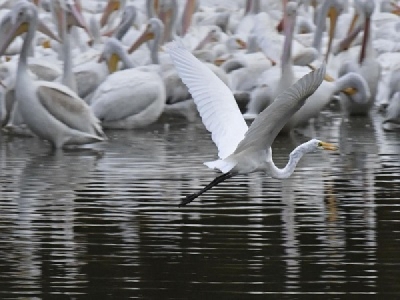
Posted on November 1, 2018
The Baton Rouge Area Foundation has asked the city-parish parks department to take the lead role in pushing forward an ambitious plan to restore and beautify the LSU lakes, from conception to construction.
That leadership position would involve having BREC commit approximately $5 million toward the engineering plan and dredging two of the lakes the parks department owns in the six-lake system.
“If they do that, it will help us raise the other dollars we need to do the rest of the lakes,” said BRAF Vice President John Spain.
LSU owns the other four lakes.
The proposals to improve the lakes have been stop-and-go for more than 10 years as city-parish leaders and state officials worked to align all the moving parts to push the project forward — like getting approval from the Army Corps of Engineers and preliminary planning funding from the state.
BRAF has previously pinned the total costs for dredging all six lakes around $25 million.
Spain first made his request to BREC’s Board of Commissioners last week at the request of BREC Superintendent Carolyn McKnight, who wanted to brief new commissioners about the project.
BREC Commissioner Davis Rhorer on Monday indicated his support, saying the parks agency has a significant role to play in the lakes’ revitalization.
But in a prepared statement, McKnight calls attention to other outstanding needs the board must prioritize, like upgrades to the Baton Rouge Zoo, Greenwood Park and Memorial Stadium.
“We plan to have commissioners go through the entire report in order to give an informed response,” McKnight said. “We understand that it is our responsibility to maintain two of the lakes and fully expect to fulfill our responsibilities, but need to share the full report, communicate with other vested parties such as the city-parish and LSU, and plan a way to fund it before we can present a timeline for action.”
The revitalization project has been percolating for several years, with BRAF developing a master plan in 2015 that not only focused on improving the lakes’ water quality but habitat creation and beautification improvements, like additional sidewalks and recreational amenities.
Rhorer said BREC wants to add boating/kayaking stations to City Park Lake, weave in the planned trails around the lakes into BREC’s multifaceted trailway system and add food and beverage stations around the lakes — proposals that were well received at public hearings three years ago.
Check out renderings: Final plan for upgrading Baton Rouge lakes revealed
The entire project has had estimated costs ranging from $80 million to $100 million.
The quicker BREC decides if it will commit the funds needed to take of its lakes, the faster BRAF can get started on pooling the other funding.
“We have a sense of urgency in this,” Spain said. “We want to start with them (BREC) to get something started on this next phase.”
Spain said converting the conceptual drawings into an engineering plan could take six to eight months. No proposed timeline has been set yet for the dredging process.
Over the years, the six lakes that make up the system created in the 1930s — City Park, University, Campus, College, Crest and Erie — have slowly been filling in with sediment from surrounding properties, which has created shallow areas that tend to heat up during the summer, leading to fish kills.
Dredging the lakes would involve sucking up the sediment that has settled on the lakebeds and repurposing that dirt to build wetlands along the banks along with dedicated pedestrian and biking trails.
Spain said the hope is to dredge all the lakes at the same time, but that would take BRAF being able to secure the money to get the bid process started.
“It would be easier and less expensive if we had one company that could do all the work,” he said, adding that “we might have to start the process and do the rest of the work when the additional funding is found.”
There was talk in 2015 about the possibility of a short-term property tax to help pay for the lakes’ restoration and improvements. Lauren Jumonville, BRAF’s director of civic leadership initiatives, said Monday the organization is no longer exploring that option.
Baton Rouge foundation executive says a short-term tax may be needed for the LSU Lakes improvement project
“We’re really trying to cobble together the funding from other sources,” she said.
Before dredging can begin, the Corps of Engineers must issue a permit, a process that Jumonville said could take up to a year or more.
“That could be happening concurrent to us converting the master plan to construction plans,” she said.
The Corps could possibly provide funding for the project, but Jumonville said BRAF is not actively pursuing that route at the moment.
McKnight is expected to make her recommendation to BREC commissioners when the board meets again in November.
Source: The Advocate





